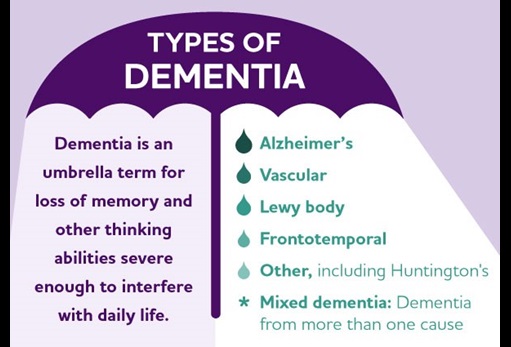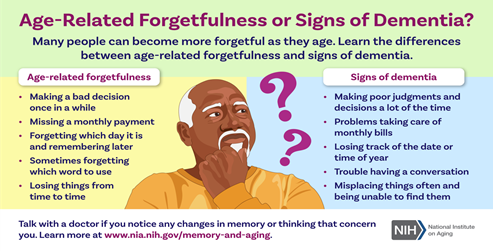Para ver información sobre la salud del cerebro en español de los CDC
***Check out the NEW Caregiver Guide! Click this link to download or request print copies.
Brain Health 101
Caring for your brain is as important as caring for your body. Having a healthy brain allows you to do activities of daily living (ADL) that are essential to your overall health and wellness. There is growing evidence that healthy behaviors, which have been shown to prevent cancer, diabetes, and heart disease, are also helpful to protecting your brain. Here are eight steps you can take for a healthy body and healthier brain.
8 Ways to Help Improve Your Brain Health according to the Center for Disease Control and Prevention (CDC)
- Quit Smoking—Quitting smoking now improves your health and reduces your risk of heart disease, cancer, lung disease, and other smoking-related illnesses. Free quitline: 1-800-QUIT-NOW (1-800-784-8669).
- Prevent and Manage High Blood Pressure—Tens of millions of adults in the United States have high blood pressure, and many do not have it under control. Learn the facts.
- Prevent and Manage High Cholesterol—Nearly 1 in 3 American adults has high cholesterol. Learn how to manage your cholesterol levels and lower your risk.
- Maintain a Healthy Weight—Healthy weight isn’t about short-term dietary changes. Instead, it’s about a lifestyle that includes healthy eating and regular physical activity.
- Get Enough Sleep—A third of American adults report that they usually get less sleep than the recommended amount.
- Stay Engaged—Stay connected with friends and family. Foster social connections that you enjoy.
- Manage Blood Sugar—Learn how to manage your blood sugar if you have diabetes.
- If You Drink, Do So in Moderation—Learn about alcohol use and your health.
See also: 10 healthy habits for your brain
About Alzheimer's Disease and Related Dementias (ADRD)
Dementia is not a specific disease but is rather a general term for the impaired ability to remember, think, or make decision that interferes with doing everyday activities. Alzheimer's disease is the most common type of dementia. Though dementia mostly affects older adults, it is not a part of normal aging.
Alzheimer's disease is the most common type of dementia. It is a progressive disease beginning with mild memory loss and possibly leading to loss of the ability to carry on a conversation and respond to the environment. Alzheimer's disease involves parts of the brain that control thought, memory, and language.
Aside from Alzheimer's disease, the most common forms of dementia are:
Facts about Alzheimer's Disease and Related Dementias (ADRD)
- Alzheimer's is the most common type of dementia, accounting for 60-80% of all dementia cases (1)
- Over 6 million people in the United States age 65 and over, or about 1 in 9 people, are estimated to have Alzheimer’s disease (2)
- A recent annual report released by the Alzheimer’s Association estimated 80,000 people in Connecticut age 65 and over had Alzheimer’s in 2020 and this number is projected to grow to 91,000 by 2025. (3)
- Currently there is no cure for ADRD. There are medications to temporarily relieve Alzheimer’s symptoms, such as memory loss and confusion.
click here to learn more about ADRD
Warning Signs and Where to Get Help
Memory often changes as people grow older. Some people notice changes in themselves before anyone else does. For other people, friends and family are the first to see changes in memory, behavior, or abilities. Memory loss that disrupts daily life is not a typical part of aging. You can learn more about warning signs by visiting the CDC Healthy Brain Initiative.
Learn about the 10 Early Signs and Symptoms of Alzheimer's
If you have concerns about your brain health or memory, consult a health care professional as soon as possible.
Connecticut's Efforts to Address ADRD and the CT ADRD Coalition
In 2021, the CT Department of Public Health (DPH) received a grant from the Centers for Disease Control and Prevention (CDC) titled, Building Our Largest Dementia Infrastructure (BOLD grant) to develop a state plan for ADRD using the Healthy Brain Road Map series. DPH worked in partnership with the Alzheimer’s Association CT Chapter to convene a CT ADRD Coalition to assist with the statewide strategic planning process under the CDC grant award. The Coalition is ongoing and includes over 50 representatives from approximately 40 organizations, including those that were involved in previous ADRD planning efforts, long-term care advisory body members, other state agencies, and health care, non-profit, and community-based organizations. The kickoff meeting of the CT ADRD Coalition took place in February of 2022. During that meeting, workgroups were formed to address specific areas of the strategic plan.
The work group focus areas included: 1.) Statewide Coordination and Policy, 2/) Early Diagnosis and Treatment, 3.) Educate and Empower, 4.) Support Caregivers and Family Members, and 5.) Data Monitoring and Evaluation. All workgroups were charged with integrating health equity and inclusion into their work. In early 2023 a Connecticut State Plan to Address ADRD was drafted.
CT ADRD Coalition:
The Connecticut Department of Public Health developed a CT Alzheimer’s Disease and Dementia Coalition. The purpose of the coalition is to draft, finalize, implement, conduct ongoing review, and formally update the plan every 2 years. Coalition members include community-based organizations, civic groups, caregivers, physicians, nurses, researchers, public health educators, faith-based organizations, and physicians who pledge to actively make changes to support people living with dementia and their caregivers.
- The Connecticut Alzheimer’s Disease & Related Dementias Strategic Plan (2023)
- The Fall 2024 recommended updates
DPH's annual Healthy Brain Initiative Legislative Reports:
We are actively seeking community members to join the coalition. If you are interested in participating, please email us at CTBrainHealth@ct.gov
RESOURCES
Brain Health Education
ADRD surveillance data
ADRD Resources
CT's State Alzheimer’s Disease & Related Dementias (ADRD) Strategic Plan.
CDC Healthy Brain Road Map series
CDC Health Aging website
Contact the BOLD Grant Team
-
Elizabeth Conklin, MPH -- Project Director Elizabeth.Conklin@ct.gov
-
Amy Mirizzi, MPH, CPH – Chronic Disease Director Amy.Mirizzi@ct.gov
-
Nadine Repinecz, MPA – Program Coordinator Nadine.Repinecz@ct.gov
-
Stephanie Poulin, MPH-- Program Evaluator Stephanie.Poulin@ct.gov
For all inquiries, please email us at CTBrainHealth@ct.gov
***content from this page adapted from the Washington State Health Department, Brain Health website and the Centers for Disease Control and Prevention Brain Health website.
References:
- Alzheimer’s Association. (2022d). What is Alzheimer’s disease? Retrieved December 3, 2022, from https://www.alz.org/alzheimers-dementia/what-is-alzheimers
- Centers for Disease Control and Prevention. (2019). About dementia. Retrieved December 5, 2022, from https://www.cdc.gov/aging/dementia/index.html
- Alzheimer’s Association. (2022a). 2022 Alzheimer’s Disease Facts and Figures. Special Report, More Than Normal Aging: Understanding Mild Cognitive Impairment. Retrieved December 6, 2022, from https://www.alz.org/media/Documents/alzheimers-facts-and-figures.pdf






